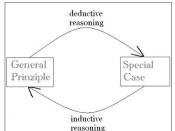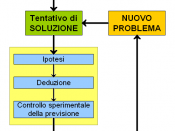In "The Crucible", Gov. Danforth responds to Rev. HaleÃÂs suggestion that John Proctor have a lawyer represent him in court. In his response, Danforth reveals his point of view on the situation. Danforth explains that there is no need to have a lawyer in the court because there are no witnesses. Danforth uses three sources of language in his rebuttal to Rev. Hale. He uses Damning with faint praise, rhetorical question, and deductive reasoning. Danforth intended purpose was to put down HaleÃÂs proposition that John Proctor needs a lawyer.
In DanforthÃÂs reply he clearly uses the resource of language Damning with Faint Praise. This means to compliment so slightly that it amounts to no compliment at all. A word related to Damning with faint praise is sarcasm. When Danforth says, ÃÂfor a man of such terrible learning you are most bewildered ÃÂ I hope you will forgive me.ÃÂ In that sentence he is insulting Mr.
Hale with a small compliment in the end. He says that Mr. Hale was not a very smart man but acted like he was. Damning of faint praise is clearly shown one in DanforthÃÂs argument.
Danforth also uses persuasive techniques such as rhetorical question in his reply. Rhetorical question is where the speaker of the writer asks a question that he already knows the answer to. Sometimes the writer will give the answer, other times it is clearly given. In his rebuttal, Danforth asks the question ÃÂwho may possible be the witness to it?ÃÂ The witch and the victim are the answers clearly given to the readers stated after the question. Danforth also asks the question, ÃÂWhat is left for a lawyer to bring out?ÃÂ This was stated at the end of his response therefore there is no stated answer. It is clearly known...



The Crucible
The essay is not really about "The Crucible." It is about Governor Danforth's reply to Reverend Hale's suggestion that John Proctor should have a lawyer in his trial. Unfortunately, the essay also fails to make clear the setting in which this question was raised. It jumps to an analysis of the rhetorical devices that Governor Danforth uses without taking up the full setting or showing how these devices in effect damn John Proctor before any evidence is taken.
"The Crucible" is a very powerful play, and Danforth's rhetoric in handling these cases is powerful. Sadly, this essay did not really set up the problem.
1 out of 1 people found this comment useful.